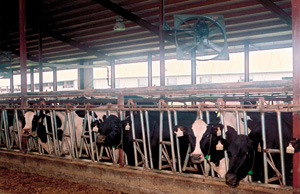
News
Work underway to ensure Wisconsin’s large farms grow in environmentally, fiscally sound ways
April 29, 2008 by Manure Manager
With the number of Wisconsin’s
largest livestock operations tripling in the last decade and the
increase expected to continue, state water quality officials have been
working with the agriculture industry and environmentalists to help
ensure that farms grow in ways that are environmentally and fiscally
sound and meet state and federal laws.
 |
With the number of Wisconsin’s largest livestock operations tripling in the last decade and the increase expected to continue, state water quality officials have been working with the agriculture industry and environmentalists to help ensure that farms grow in ways that are environmentally and fiscally sound and meet state and federal laws.
The state’s Department of Natural Resources has been working with agricultural and environmental groups for two years to revise the state rule governing large livestock operations to ensure it reflects changes in federal laws and responds to growing public and environmental concerns over manure-related problems. The agency was seeking to hold public hearings on the proposed changes this past summer.
“The number of large-scale livestock operations has more than tripled in Wisconsin in the last decade, and we expect to see a continued increase in the number of larger operations,” says Tom Bauman, who coordinates the Department of Natural Resources’ agricultural run-off program.
“We don’t regulate the size of operations. Our concern and our responsibility is water quality. We’d like to have farms grow responsibly over time so that animal agriculture can continue to thrive.”
A technical advisory committee has been working since September 2003 on revisions to Chapter NR 243 of the Wisconsin Administrative Code, which applies primarily to larger-scale operations that are required to get a water quality protection permit. These Concentrated Animal Feeding Operations have at least 1,000 animal units, the equivalent of 700 milking cows, 2,500 hogs or 55,000 turkeys.